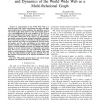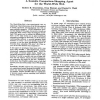114 search results - page 2 / 23 » Learning to construct knowledge bases from the World Wide We... |
SOCIALCOM
2010
13 years 3 months ago
2010
A representation of the World Wide Web as a directed graph, with vertices representing web pages and edges representing hypertext links, underpins the algorithms used by web search...
ICASSP
2008
IEEE
13 years 11 months ago
2008
IEEE
Most of the Web-based methods for lexicon augmenting consist in capturing global semantic features of the targeted domain in order to collect relevant documents from the Web. We s...
WWW
2001
ACM
14 years 6 months ago
2001
ACM
The enormous growth of the world wide web in recent years has made it important to perform resource discovery e ciently. Consequently, several new ideas have been proposed in rece...
WWW
2007
ACM
14 years 6 months ago
2007
ACM
As part of a large effort to acquire large repositories of facts from unstructured text on the Web, a seed-based framework for textual information extraction allows for weakly sup...
AGENTS
1997
Springer
13 years 9 months ago
1997
Springer
The World-Wide-Web is less agent-friendly than we might hope. Most information on the Web is presented in loosely structured natural language text with no agent-readable semantics...


